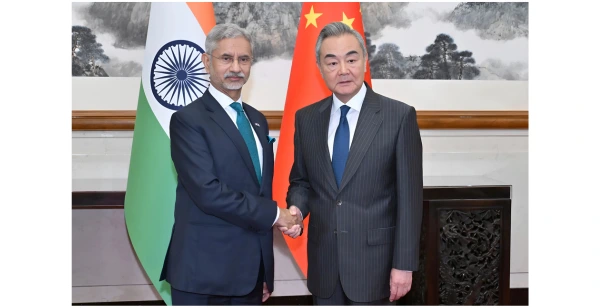India–China Engagement: Jaishankar & Wang Yi Signal Economic Thaw Amid Border Diplomacy
New Delhi, August 19, 2025 – At a time when the world is navigating uncertainty, India and China have taken a cautious but important step towards renewing cooperation. During a high-level meeting in New Delhi, External Affairs Minister Dr. S. Jaishankar reaffirmed India’s long-standing position on Taiwan, while Chinese Foreign Minister Wang Yi assured that Beijing would resume the supply of essential commodities like fertilisers, rare earth minerals, and tunnel boring machines (TBMs).
This meeting, though brief, is being viewed as a window of opportunity for the two Asian powers to move forward, balancing their differences while focusing on common ground.
India’s Steadfast Position on Taiwan
Dr. Jaishankar was clear and firm when the issue of Taiwan came up. He reminded his Chinese counterpart that India’s policy remains unchanged. India recognizes Taiwan only in the context of economic and cultural exchanges—not as a political recognition.
This clarification not only aligns with India’s established diplomatic tradition but also reinforces its credibility on the global stage. At a time when tensions around Taiwan draw international attention, India’s consistency helps avoid unnecessary ambiguity.
China’s Assurance on Key Supplies
For India, one of the most welcome developments was Wang Yi’s assurance to resume critical exports that had been restricted for almost a year.
-
Fertilisers (Urea, NPK, DAP): With nearly 30% of India’s fertiliser imports coming from China, this decision will ease the burden on farmers, stabilize prices, and secure food production cycles.
-
Rare Earth Minerals: These resources are crucial for India’s growing EV sector, renewable energy projects, and electronics industry. Shortages had slowed down progress in clean mobility and high-tech manufacturing.
-
Tunnel Boring Machines (TBMs): These machines are vital for large infrastructure projects—metro networks, smart city construction, and the Ahmedabad–Mumbai bullet train corridor. Resuming their supply will prevent costly project delays.
By addressing these gaps, the agreement marks a positive step that could have a direct impact on India’s economy and daily life.
Border Issues Deferred, Dialogue Ahead
Interestingly, the meeting avoided deep discussion on boundary disputes. Instead, both sides agreed to handle these matters separately during the 24th round of the Special Representative Dialogue, led by National Security Advisor Ajit Doval and Wang Yi.
This decision to keep economics and border diplomacy in separate lanes may actually prove practical. It allows progress in areas where cooperation is possible, while leaving room for structured negotiations on sensitive security matters.
Shared Pressures, Shared Realities
The backdrop of the talks cannot be ignored. With U.S. trade policies under Donald Trump putting pressure on both India and China, the two nations have realized that cooperation might help them weather global disruptions.
Jaishankar described the discussions as “candid and constructive,” while Wang Yi emphasized the need for mutual respect and sensitivity. Both sides agreed that differences should not spiral into disputes—a reminder that dialogue is still the most powerful tool in diplomacy.
Why This Meeting Matters for India
The outcomes of the meeting carry weight for India across multiple dimensions:
-
Agriculture Security: Farmers will benefit from steady fertiliser imports, protecting them from price fluctuations and shortages.
-
Infrastructure Growth: Major projects, from metro rails to highways, will regain momentum with TBM supplies resuming.
-
Technology & Industry: The restoration of rare earth imports will support India’s ambitions in electric vehicles, smartphones, and renewable energy.
-
Diplomatic Balance: By sticking firmly to its Taiwan stance, India demonstrates reliability while still engaging with China pragmatically.
-
Border Stability: With NSA-level talks on the horizon, there is hope for gradual de-escalation along the Line of Actual Control (LAC).
Towards Sustainable and Eco-Friendly Cooperation
What makes this engagement stand out is its relevance to sustainability and eco-friendly growth. Rare earths fuel clean technologies. Fertilisers ensure food security in a growing population. TBMs enable modern infrastructure that reduces congestion and pollution in cities.
By addressing these sectors, India and China are not just talking trade—they are laying foundations for a more sustainable future. The meeting subtly highlighted that collaboration, even in small steps, can promote stability, resilience, and shared progress.
Quick Summary
| Focus Area | Key Takeaway |
|---|---|
| Taiwan Policy | India’s consistent economic & cultural ties reaffirmed |
| Supply Issues | China to resume fertilisers, rare earths, TBMs |
| Border Diplomacy | NSA-level talks to focus on de-escalation at the LAC |
| Strategic Context | U.S. tariffs drive stronger India–China dialogue |
| Economic Gains | Boost for agriculture, infrastructure, EVs & technology |
Conclusion
The Jaishankar–Wang Yi meeting is not a breakthrough, but it is certainly a signal of intent. By prioritizing supplies that impact ordinary citizens—fertilisers for farmers, minerals for industries, and machinery for infrastructure—both sides have shown that progress is possible when mutual benefit is at the heart of dialogue.
For India, the decision brings relief to key sectors and demonstrates the strength of its consistent foreign policy. For China, it reflects recognition that engagement with India is essential in today’s shifting global order.
The road ahead will not be free of challenges, particularly on the border. But this economic thaw offers hope that constructive cooperation, grounded in sustainability and shared responsibility, can guide Asia’s two largest nations towards a more stable future.














